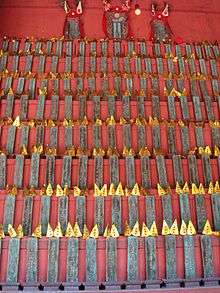Spirit tablet
| Spirit tablet | |||||||||||||||
 Spirit tablets for ancestors in Hong Kong | |||||||||||||||
| Chinese name | |||||||||||||||
|---|---|---|---|---|---|---|---|---|---|---|---|---|---|---|---|
| Chinese |
1. 神主牌 2. 神位 3. 神牌 | ||||||||||||||
| Literal meaning |
1. spirit master sign 2. spirit seat | ||||||||||||||
| |||||||||||||||
| Vietnamese name | |||||||||||||||
| Vietnamese alphabet | bài vị | ||||||||||||||
| Chữ Hán | 牌位 | ||||||||||||||
| Korean name | |||||||||||||||
| Hangul |
1. 위패 2. 신위 | ||||||||||||||
| Hanja |
1. 位牌 2. 神位 | ||||||||||||||
| |||||||||||||||
| Japanese name | |||||||||||||||
| Kanji | 位牌 | ||||||||||||||
| |||||||||||||||
A spirit tablet, memorial tablet, or ancestral tablet,[1] is a placard used to designate the seat of a deity or past ancestor as well as to enclose it. The name of the deity or past ancestor is usually inscribed onto the tablet. With origins in traditional Chinese culture, the spirit tablet is a common sight in many East Asian countries where any form of ancestor veneration is practiced. Spirit tablets are traditional ritual objects commonly seen in temples, shrines, and household altars throughout China and Taiwan.[2]
General usage
A spirit tablet is often used for deities and ancestors, with shrines found in households or in temples, where there are specific rooms for individual spirit tablets for ancestors. A spirit tablet acts as an effigy of a specific deity or ancestor. When used, incense sticks are usually burned before the tablet. Sometimes fruits, tea, pastries, or other offertory items are placed near the tablet to offer food to that particular spirit. In Taoism, spirit tablets are often used for ancestors and sometimes such tablets are found under deities, which represent the enclosed spirit of the deity. In Buddhism, spirit tablets are used in the same manner, but Buddhist tablet usage is not limited to ancestors, but to wandering spirits, demons, hungry ghosts, and even to the living (for perpetual blessing of the donor). In Japanese Buddhism, tablets are used in funeral rites and stored in the home butsudan. Tablets are also common in Japanese temples.
In Chinese folk religion for example, a household will have one or more tablets for specific deities:
- One outside the house at the front door. (A shrine either to the Jade Emperor at eye level the door or the earth deity, below the door.)
- One in the kitchen. (A shrine to the Kitchen God, Zao Jun).
- Two in the house, usually at least one in the living room. (A shrine to any other deity or family ancestors.)
In Korean culture, spirit tablets are of great importance in ancestral rites called jesa, as they are the centerpieces of food offerings and represent the spiritual presence of the deceased.
A spirit tablet is not the same as an idol.
Gallery
- Tablet in Taiwan
 A stone tablet
A stone tablet
(Name has been blurred for protection)
See also
References
- ↑ Li, Xiaoxiang; Fu, Chunjiang; Goh, Geraldine (2004). Origins of Chinese people and customs (Revised ed.). Singapore: Asiapac Books. p. 130. ISBN 978-981-229-384-8.
ancestral tablet
- ↑ "Ancestors and Deities: Chinese Spirit Tablets". Museum of Anthropology. University of Missouri. Retrieved 19 September 2011.